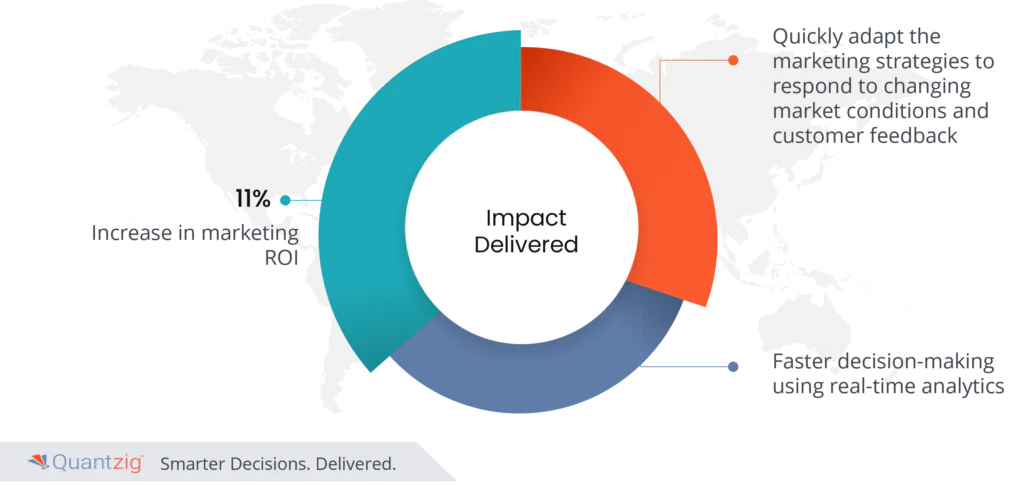Written By: Aniket Kejriwal
AI is redefining the way marketers understand and interact with their audiences. From predictive analytics that foretell consumer behaviors to personalized content creation, AI is enabling a new era of marketing that is more responsive, targeted, and effective. This shift towards AI-driven marketing is not just a technological advancement; it represents a fundamental change in the approach to customer engagement and brand building.
In the dynamic field of marketing, the integration of Artificial Intelligence (AI) has become a pivotal element in shaping strategies, unstructured data, and enhancing effectiveness. The contemporary marketing environment is characterized by a plethora of channels through which customers interact, making traditional methods increasingly obsolete. AI stands at the forefront of this revolution, offering innovative solutions to tackle the complexities of modern marketing landscapes.
Table of Contents
Importance of AI in Marketing

The significance of AI in marketing cannot be overstated. In today’s digital age, customers are exposed to multiple channels of communication, each offering a unique interaction experience. AI helps businesses navigate this multifaceted environment by providing tailored marketing strategies that resonate with diverse customer segments. This approach not only ensures a more personalized customer experience but also enhances the efficiency of marketing campaigns.
Challenges in Implementing AI in Marketing
AI’s impact extends to the realm of customer insights and market research. By utilizing machine learning and marketing analytics algorithms, marketers can uncover patterns and trends in consumer data that were previously undetectable. This level of insight is transforming how marketing strategies are developed, allowing for a more nuanced understanding of different market segments.
In the realm of digital advertising, AI is playing a pivotal role in optimizing ad placements and targeting. By analyzing user data, AI can determine the most effective times and platforms for ad displays, ensuring maximum visibility and engagement. This precision in advertising not only enhances campaign effectiveness but also reduces the wastage of marketing resources.
While AI presents immense potential, its implementation in marketing is not without challenges. The primary obstacle lies in the ever-evolving nature of customer needs and technological advancements. Marketers must constantly adapt their AI strategies to align with changing consumer preferences and emerging tech trends. This requires a robust understanding of AI exploration tools and the agility to integrate new developments swiftly into marketing practices.
Request a free proposal to understand how.
Benefits of Implementing AI in Marketing

Adopting AI in marketing also demands a cultural shift within organizations. The transition from traditional marketing methods to AI-driven strategies requires not only technological adaptation but also a change in mindset and skillset among marketing teams. This cultural and operational shift is often one of the biggest hurdles companies face when integrating AI into their marketing practices.
Implementing AI in marketing comes with a host of benefits. One of the most significant advantages is the ability to work with large volumes of data effectively. AI algorithms can analyze and interpret complex healthcare data sets, providing insights that drive strategic decisions. This data-driven approach leads to a more accurate targeting of marketing efforts, culminating in an increase in marketing ROI. For instance, leveraging AI in customer segmentation and personalized marketing campaigns can significantly enhance customer engagement and conversions.
Furthermore, the challenge of data quality and management is crucial in AI implementation. For AI systems to function effectively, they require high-quality, relevant data, data security, and privacy. Many businesses face difficulties in data collection, processing, and analysis, which can impede the successful deployment of AI solutions.
Success Story:
Unleashing Marketing Potential: How Quantzig Transformed a Client’s Success with AI-Driven Marketing Effectiveness
Client location:
USA
Challenges faced by the client:
AI is significantly enhancing customer segmentation, allowing marketers to deliver more precise and relevant marketing messages. By analyzing customer data, AI can identify specific needs and preferences, enabling marketers to create highly customized marketing campaigns that resonate with individual customers or customer segments.
A practical example of AI’s impact can be seen in a case study involving a client based in the USA. This client faced challenges in addressing a diverse customer base across various channels. The traditional marketing methods were proving inadequate in effectively engaging this varied audience.
Solutions offered by QZ:
AI also plays a vital role in enhancing customer journey mapping. By analyzing customer interactions and touchpoints, AI can help marketers understand the path to purchase and identify key areas for engagement. This insight is invaluable in creating a seamless and personalized customer journey, which is essential for building long-term customer relationships.
In response to these challenges, Quantzig implemented an advanced machine learning (ML) based framework. This solution was tailored to analyze customer behavior across different channels, enabling the client to deliver personalized marketing messages. The ML framework not only streamlined the marketing process but also provided actionable insights for future marketing initiatives.
Impact Delivered

The implementation of AI-driven solutions yielded remarkable results. The client experienced an 11% increase in marketing ROI while maintaining the same spending level. This improvement was a direct consequence of the enhanced targeting and personalization capabilities provided by AI.
The use of AI in this case study also highlighted the importance of agile marketing. By leveraging AI’s real-time analytics, the client was able to quickly adapt their marketing strategies to respond to changing market conditions and customer feedback. This agility is critical in today’s fast-paced business environment.
The role of AI in enhancing marketing effectiveness is indisputable. As AI technology continues to evolve, its integration into marketing strategies will become more profound. Businesses that leverage AI’s power will find themselves at a significant advantage, capable of delivering more personalized, efficient, and impactful marketing campaigns. The future of marketing lies in the intelligent use of AI, a future that is data-driven, customer-centric, and ever-evolving.
The integration of AI in marketing transcends traditional boundaries, offering a new paradigm in customer engagement and brand promotion. AI’s capability to analyze vast arrays of data from various sources enables marketers to gain unprecedented insights into consumer behavior and preferences. This evolution from guesswork to data-driven strategies marks a significant leap in the marketing domain, opening doors to unexplored possibilities for customer interaction and brand growth.
Quantzig’s solution also included advanced customer segmentation techniques. By using AI to segment customers based on various criteria such as behavior, preferences, and demographics, the client was able to tailor their marketing efforts more effectively. This targeted approach resulted in higher engagement rates and better conversion rates.
Moreover, AI-driven marketing tools allow for real-time decision-making and optimisation of marketing campaigns. Through predictive analytics, AI can forecast consumer trends and purchasing behaviors, enabling marketers to stay ahead of the curve. This proactive approach not only enhances customer satisfaction but also drives business growth by identifying and capitalising on emerging market opportunities.
Another significant challenge is the integration of AI into existing marketing infrastructures. Many organizations struggle with the technical and operational aspects of implementing AI solutions. This includes issues like data silos, lack of skilled personnel, and the need for substantial investments in technology and training. Overcoming these hurdles is crucial for businesses to fully leverage the potential of AI in their marketing strategies.
Furthermore, AI’s ability to personalize customer experiences at scale is a game-changer in marketing. By leveraging AI-driven analytics, businesses can create highly personalized marketing messages and offers that resonate with individual customers. This level of personalization fosters a deeper connection between the brand and the customer.
“Empower your business with Artificial Intelligence—ensuring accuracy, compliance, and strategic excellence. Elevate your operations to new heights by investing in the backbone of successful decision-making and sustained growth.”


